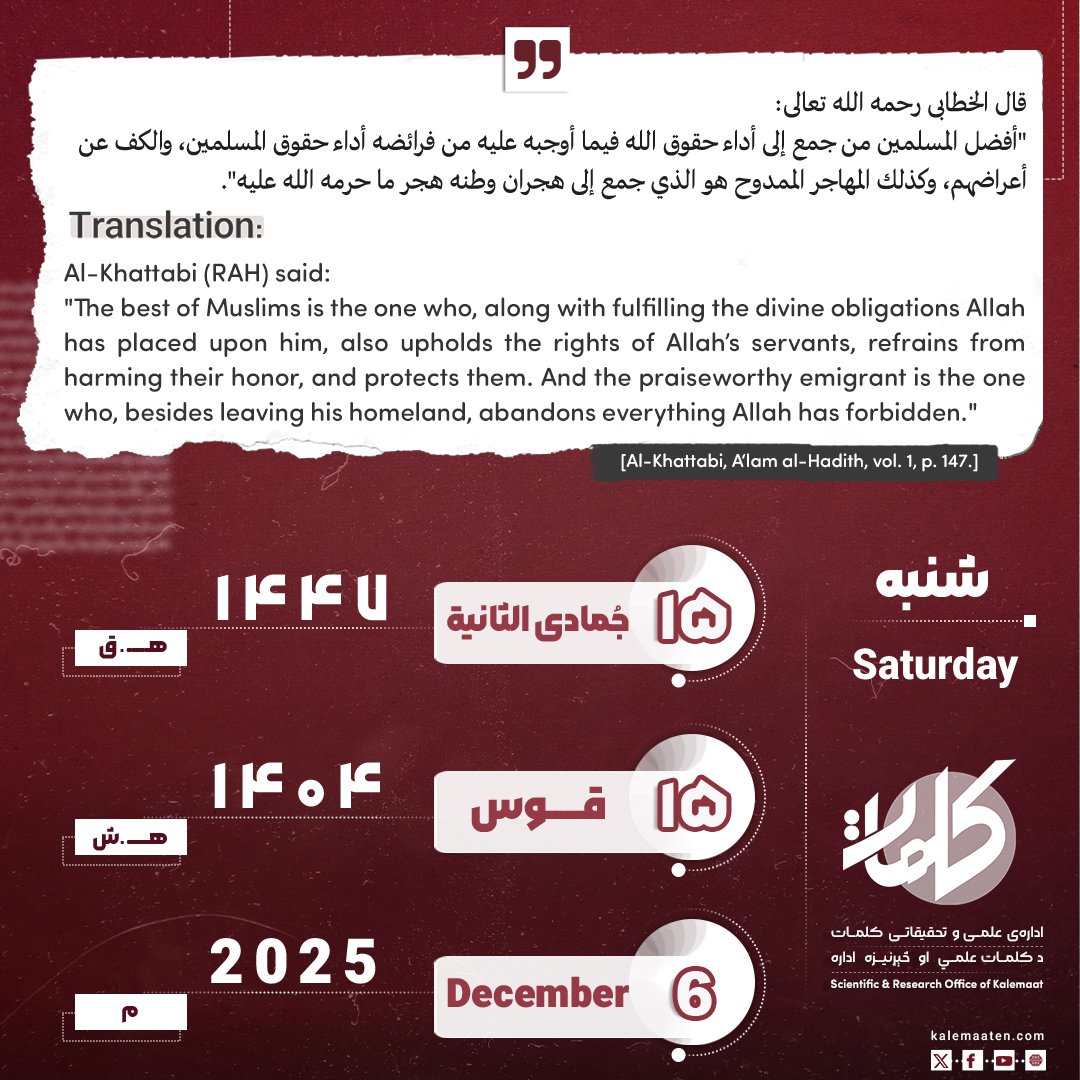Author: Um Saadiyah
One of the Advices of the Prophet (PBUH) for Women (Part 4)
10- Warning Against Backbiting
Ayesha (may Allah be pleased with her) said: I said to the Messenger of Allah (peace and blessings be upon him), “It is enough for you regarding Safiyyah (the wife of the Messenger of Allah, peace and blessings be upon him, and the co-wife of Ayesha) that she is such and such,” meaning her short stature. The Messenger of Allah (peace and blessings be upon him) said: “You have uttered a word that, if it were to be mixed with the water of the seas, it would contaminate it.”
Ayesha (may Allah be pleased with her) said: I imitated someone before the Messenger of Allah (peace and blessings be upon him). He said: “I dislike imitating anyone, even if I were to receive such and such in return.”
Imam al-Nawawi (may Allah have mercy on him) said: “This Hadith is among the most eloquent in prohibiting backbiting.”
Allah the Exalted has warned against backbiting, saying: «وَلَا يَغْتَب بَّعْضُكُم بَعْضًا أَيُحِبُّ أَحَدُكُمْ أَن يَأْكُلَ لَحْمَ أَخِيهِ مَيْتًا فَكَرِهْتُمُوهُ وَاتَّقُوا اللَّهَ إِنَّ اللَّهَ تَوَّابٌ رَّحِيمٌ» Translation: “And do not backbite one another. Would one of you like to eat the flesh of his dead brother? You would detest it. And fear Allah; indeed, Allah is Oft-Returning, Most Merciful.” [1]
My sister! Backbiting may occur by gestures, by imitating someone, or by saying: “So-and-so is tall” or “So-and-so is talkative,” or by any words that expose the faults of an absent person. All of these are prohibited. However, know that backbiting is permissible in specific cases allowed by Shariah, such as:
-
To seek justice before a ruler;
-
To seek help in removing an evil;
-
To ask for a legal opinion (Fatwa), such as saying: “My brother or my husband wronged me”;
-
In matters of marriage (when someone intends to marry and seeks advice, you may inform them of defects);
-
To warn against someone who may cause harm;
-
To identify a person by a known characteristic such as lame, blind, etc. (but if they can be identified without mentioning defects, that is better).
11- Commitment to the Islamic Veil (Hijab)
Umm ʿAtiyyah (may Allah be pleased with her) said: “The Messenger of Allah (peace and blessings be upon him) commanded us all to attend the two ʿĪd festivals (ʿĪd al-Fitr and ʿĪd al-Adha), including the secluded virgins and women in menstruation. He said that the menstruating women should avoid the prayer but attend the supplications of the Muslims.”
I said: “O Messenger of Allah, what if one of us does not have a cloak?” He said: “Her Muslim sister should cover her with her cloak.”
My sister! This means you may attend both ʿĪds whether you are a young girl or experiencing menstruation or post-natal bleeding, on the condition that you do not participate in the prayer (and if the event is not held in the mosque).
Another point in this Hadith is the obligation of Hijab. You must not go out without it, for the word Jilbab (mentioned in the Hadith) refers to a garment worn over the headscarf, covering the entire body, including the face. Beware of going out without Hijab, and always remember the saying of Allah the Exalted: «يَا أَيُّهَا النَّبِيُّ قُل لِّأَزْوَاجِكَ وَبَنَاتِكَ وَنِسَاء الْمُؤْمِنِينَ يُدْنِينَ عَلَيْهِنَّ مِن جَلَابِيبِهِنَّ ذَلِكَ أَدْنَى أَن يُعْرَفْنَ فَلَا يُؤْذَيْنَ وَكَانَ اللَّهُ غَفُورًا رَّحِيمًا» Translation: “O Prophet, tell your wives and your daughters and the women of the believers to draw their cloaks closely over themselves. That is more suitable so that they will be recognized and not abused. And ever is Allah Forgiving and Merciful.” [2]
O my Muslim sister, strictly avoid self-display and do not be among those about whom the Messenger of Allah (peace and blessings be upon him) said: “Two groups of the people of Hell I have not yet seen: People with whips like the tails of cattle with which they strike people, and women clothed yet naked, attracting men and themselves inclined to men, with heads like the humps of camels leaning to one side. They will neither enter Paradise nor smell its fragrance, though its fragrance can be found from a great distance.” [3]
12- Prohibition of Wailing (Lamentation)
ʿAbdullah ibn Masʿūd (may Allah be pleased with him) narrated that the Messenger of Allah (peace and blessings be upon him) said: “The one who strikes his face, tears his garment, and cries with the cries of the Days of Ignorance is not from us.” [4]
Abu Musa al-Ashʿari (may Allah be pleased with him) narrated that the Messenger of Allah (peace and blessings be upon him) said:
Four practices of the Days of Ignorance will remain in my Ummah and they will not abandon them:
-
Boasting about lineage;
-
Slandering people’s ancestry;
-
Seeking rain through the stars;
-
Wailing.
Then he said: “The wailing woman, if she does not repent before her death, will be raised on the Day of Resurrection wearing a garment of molten copper and a cloak of scabies.” [5]
The word Qatran (mentioned in the Hadith) refers to molten copper. We seek refuge in Allah. Therefore, my sister, strictly avoid wailing and turn back to Allah the Exalted.
Continues…
Previous Part/ Next Part
References:
[1] Qur’an, Surah al-Ḥujurāt, 49:12
[2] Qur’an, Surah al-Aḥzāb, 33:59
[3] Narrated by Muslim
[4] Narrated by al-Bukhari and Muslim
[5] Narrated by Muslim
